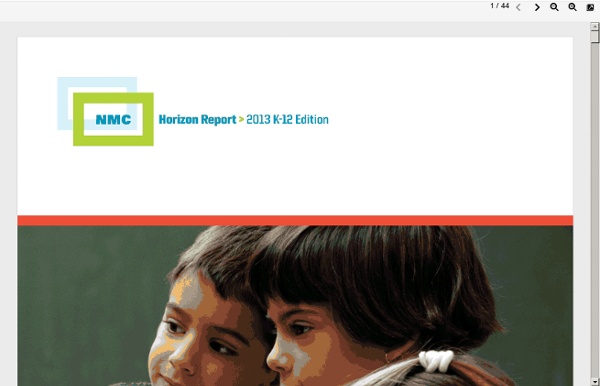



Innovation Design In Education - ASIDE Twelve learning technologies with big education potential By Laura Devaney, Managing Editor, @eSN_Laura Read more by Laura Devaney May 22nd, 2013 Learning technologies that will become widespread and widely-implemented in a year or less: 1. Bring your own device initiatives 2. Cloud computing 3. Mobile learning 4. Online learning Technologies and practices that have the potential to change teaching and learning, but that are two or three years from popular practice, include: 5. Four or five years down the line, learning technologies that may dramatically influence education include: 9. 3D printing 10. Several key factors are driving technology trends: Key challenges include: Ongoing professional development needs to be valued and integrated. The report is produced by the New Media Consortium, the Consortium for School Networking, and the International Society for Technology in Education.
Why people may not like your PowerPoint Presentations? If you want to give an outstanding Microsoft PowerPoint presentation then this blog is for you. Here you will learn how to avoid five common mistakes which kills PowerPoint presentation. Read this and get ready to give best presentation. How to make strong PowerPoint presentation. Mere surviving your PowerPoint presentation can not be considered as your success. So, what all you need is just focus on audience, settle your nerves and give your best!! Now, we will be discussing about deadly mistakes that often made by a mediator while giving presentation: 1. Don’t speak much about your product, company or services just adhere to your goal. 2. Let your audience know what they will get from your presentation by hearing you attentively, in fact you can add a slide having title “what you will get?” You can download a template like this one from Simple PowerPoint template (green). 3. 4. 5. If you find them eagerly writing tidbits then you know your efforts have worked. Loading ...
2013-Horizon.K12-Shortlist_v3.1 - 2013-horizon-k12-shortlist.pdf 10 ed-tech tools of the 70s, 80s, and 90s By Meris Stansbury, Associate Editor Read more by Meris Stansbury May 10th, 2013 We don’t know about you, but sometimes the eSchool News editors are amazed to hear about the ed-tech students use to learn in schools these days: mobile gaming apps, 3D printing, and robots? Many of the editors still remember the prestige of walking to the front of the class and writing on the chalkboard with colored chalk. To celebrate technologies of the past, the editors of eSchool News have compiled a list of the education technologies we and our teachers used back in the day–you know, before the internet even existed. Can you think of an ed-tech tool not on the list? (Next page: Ed-tech of the 70s, 80s, and 90s)
Literacy Using video to improve teaching and learning By Kari Arfstrom Read more by Contributor February 22nd, 2012 Iowa teachers can model or learn from exemplary lessons by posting or watching short videos online. Knowing that good teaching leads to increased student achievement, the Great Prairie Area Education Agency (GPAEA) in Ottumwa, Iowa, already had legacy programs in place to coach and mentor new teachers and to highlight best practices of professional educators using video. Research and common sense show that self- and shared reflection for beginning and established educators, often by viewing audio and visual recordings made in the classroom, is an important and common practice. The GPAEA leadership team, led by then-Chief Administrator Joe Crozier and current Chief Administrator Jon Sheldahl, wanted a web-based place to store videos for ongoing professional development for and by local district educators.
Literacy Is Not Enough: 21st Century Fluency for the Digital Age by Ian Jukes These are my notes from Ian Jukes‘ METC 2010 presentation, “Literacy Is Not Enough: 21st Century Fluency for the Digital Age” at the METC 2010 conference. MY THOUGHTS ARE IN ALL CAPS. I haven’t heard Ian present in quite a few years. Quoting Don Tapscott, “Grown Up Digital: How the Net Generation is Changing Your World” consumers vs prosumers In have value entertain teach students today may be literate by the standards of the 20th century, but won’t be literate by the standard of OUR society today we need to move to 21st century literacies or fluencies – when you are literate, you still have to think about what you are going to do next – fluencies are unconscious skills, you just “know” what to do next hands up: who learned to ride a bicycle? this is NOT about teaching kids MS Word – this about helping kids become better writers – helping kids become better problem solvers – better communicators decisionmaking, time management, etc. How many times have you heard some Literacy is NOT enough